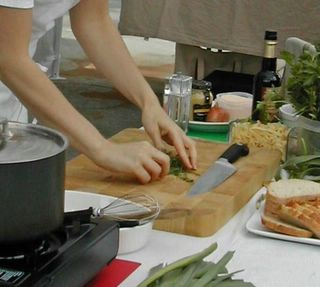Wednesday, February 02, 2005
Splenda, Part 2
I read this today, and wanted to make sure everyone sees it. Please see my earlier post on Splenda for additional information.
WASHINGTON (Reuters) - Johnson & Johnson is facing a raftof lawsuits over a marketing campaign related to its artificialsweetener Splenda, which accuse the company of misleadingbuyers to believe Splenda is a natural product.
Splenda, which has enjoyed rapid sales growth on the backof a boom in low-carbohydrate eating in the last couple ofyears, is marketed by J&J's McNeil Nutritionals Worldwide division with the line: "Splenda No Calorie Sweetener is madefrom sugar, so it tastes like sugar."
But the Sugar Association says the marketing pitch does notaccurately reflect the end product and is misleading because itgives the impression that Splenda contains natural sugar.
McNeil faces three class-action suits from individuals, onefrom the Sugar Association and one from Merisant Worldwide Inc, the maker of rival low-calorie sweetener products including Equal and Canderel.
"Johnson & Johnson is misinforming consumers about the reality of the chlorinated product Splenda," said James Murphy,counsel for the Sugar Association, whose lawsuit seeks unspecified damages, a nationwide injunction and corrective advertising.
"We feel the public needs to be aware that Splenda is anartificial chemical sweetener. Splenda is created withchlorine, and the final product does not have sugar in it," hesaid.
Splenda's Web Site (www.splenda.com) says the product is made "through a patented process that starts with sugar andconverts it to a no calorie, noncarbohydrate sweetener. The process selectively replaces three hydrogen-oxygen groups onthe sugar molecule with three chlorine atoms."
A spokeswoman for McNeil Nutritional told Reuters that thelawsuits had no merit.
"Consumers are utilizing no-calorie sweeteners versus othersweeteners like sugar, and you would have to draw your ownconclusions about why now these efforts are being launched."said Monica Neufang, director of communications for McNeil,
"We have never represented Splenda as being natural," shesaid.
Splenda has just over 50 percent of the U.S. market for low calorie sweeteners, based on dollar volume, according to datacollected by IRI and made available to Reuters by McNeil.
It is used in products which include Kool-Aid Jammers 10 tropical Punch drink, produced by Kraft Foods .
"Obviously, any organization that represents the sugar growers of the world would like to have people know what theyare buying when they are buying a sweetener," said DanCollister, attorney at Squire, Sanders and Dempsey, acting forthe Sugar Association.
Separately, the Texas Consumer Association said on Monday it had asked the U.S. Federal Trade Commission to investigate the Splenda marketing campaign.
"With consumers across the country concerned about theirhealth and trying to eat more natural foods, it is alarmingthat McNeil is engaged in an under handed campaign to confuse consumers into believing Splenda is natural," commented SandraHaverlah, president of the Texas Consumer Association.
Haverlah said she was working with the Consumer Federation Network and was not associated with the groups bringing suitsagainst Splenda.
No one from Merisant was available for comment.
<< Home
